Last updated on April 15th, 2024
Women share stories of deeply transformational travel
by Amanda Burgess
Let’s face it – as much as solo travel is life-affirming and transformative, it can also be deeply uncomfortable at times. Solo travel forces us to face our true selves as we interact with the world. The parts of ourselves we’d forgotten or neglected. The parts we’d rather not face. It pushes us out of our comfort zones, out of long-held perspectives, and rocket launches us on a journey of self-discovery, growth, and transformation.
This holiday season, we asked you, our JourneyWomen sisters, to tell us about the times when you’ve felt transformed during solo travel. And oh my, did you deliver. We are proud to share your stories.
Some of you plan to get uncomfortable by heading off alone – and on the other side of that, find a deep sense of belonging.
In 1990, a then 38-year-old Brenda decides to head to Oaxaca, Mexico on her own over Christmas. It’s a place she visited with family previously, roaming the markets and Zocalo on her own. This time, it’s an exercise to prove to herself that she can spend the holidays solo to safeguard against a future time in her life when she may have no choice.
She calls her family the day before Christmas and is sitting alone in her little hotel apartment, feeling lonely. The whole city is singing and dancing in the street, and about an hour before midnight, she hears a knock on her door.
“I could hear the rumble outside my door in the square and thought ‘hey! I came to be here alone,'” she says. “Then there was a bang on my door. Then another. And another. I let them keep banging until I realize I’d better brush my hair and answer the door. When I open up, a few dancing strangers who had seen my light on cajoling me to join in. I feel I have little choice but to hop on in.”
She does, and immediately feels welcomed to the party. “I soon realize we are dancing in a big circle through the complex [and see my way back to my apartment],” she says. “I wave a feverish goodbye and slip back in with a big, goofy smile on my face. I have to laugh because I was really enjoying myself when all was said and done.”
From the experience, Brenda learns that it’s important to slow down, remember who she really is – and realizes that she needs to make time to do this in her own city. That’s her biggest takeaway from traveling alone; the realization that she can slow down and spend time alone in her home city of Toronto. “It’s made me feel comfortable signing up for meet-ups, joining groups, and volunteering, and I will often take time after an appointment in parts of the city I don’t ordinarily frequent to explore the area.”
Some of you follow your intuition up a hill to a small church and emerge with an overwhelming sense of gratitude.
Marti S. is in Swaziland with a group. But as she often does, she breaks away from the group. It’s a Sunday morning market in Mbabane, the capital of the poor kingdom, and she is taking food to cook and give to kids at a feeding center run by an NGO. That’s when she hears singing, much like American gospel but more rhythm.
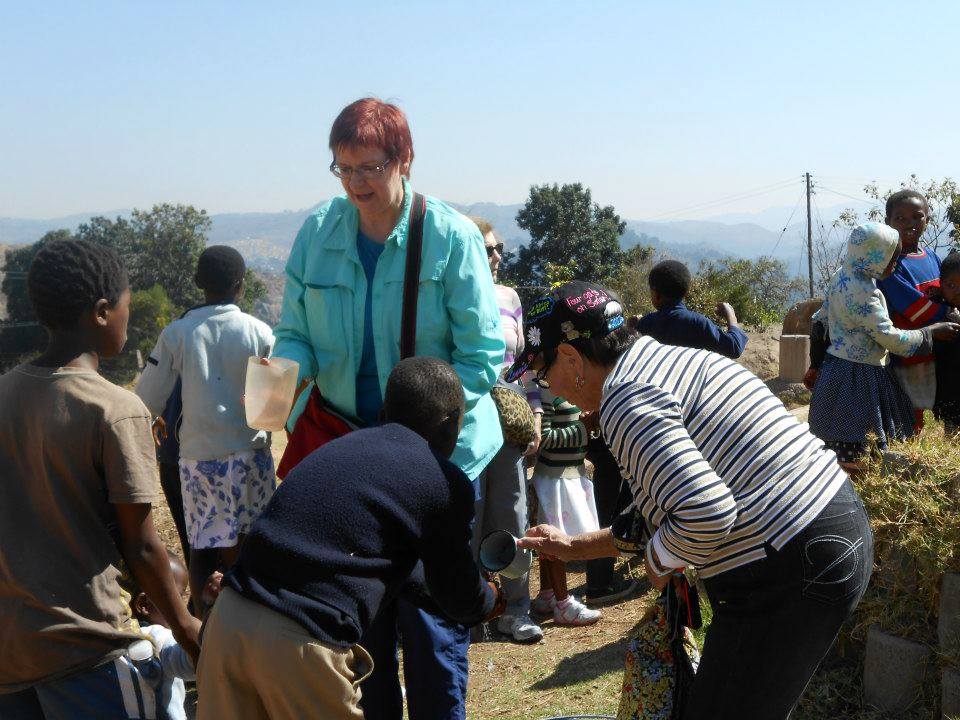
Marti S. working at the feeding center in Swaziland
“It’s a siren call, as music usually is when I travel,” she says. “My body starts moving to the music and carries me up a hill where I see a tiny ramshackle church.”
It is hot. The church is small, brightly coloured and windowless. She peeks into the doorway, and a woman catches her eye and gestures her in, where she is pulled into the front row.
“I join in as best I can, given I do not speak any Zulu dialects. At first, I’m aware of being the only white face there, an odd experience for me, but that fades. You can feel the spirit moving in that room,” she says. “It’s a much deeper spiritual experience than any service I ever attended. I could only stay a while but feel the love. It follows me, with the music, all the way back down the hill.”
The lasting lesson, Marti says, is gratitude for what you have, even if you wish and work for more. She discusses the experience with two African-American women afterward, and they say how strange, moving and wonderful it is to be somewhere they were seeing mainly other people who look like them. It makes her so much more aware of white privilege, and how racial and gender discrimination at home are not equivalent.
“For a moment, I experience the trepidation of being the minority and anticipating suspicion and lack of acceptance,” she reflects. “I was already an attorney working on civil rights issues and progressive causes. I guess you could say I was sympathetic to matters of discrimination. I think this experience helps turn that towards empathy.”
Some of you have dedicated your lives to getting comfortable with being uncomfortable as you travel solo full-time.
Aurelia I. has been traveling solo for three years now. This is the year she finally makes the jump, sells her house and all her belongings to do so full time. “It’s a different experience when you don’t have a home to go back to and your life is pretty much packed away in an aluminum suitcase,” she says. “But I’ve learned the simpler the better. It’s okay for me to live my own story, even if it doesn’t make sense to most people. It’s not their journey.”
A highlight of that journey is returning to Cheetah Experience in South Africa, where she is volunteering for the second time. The animals – a Siberian Tiger, lions, cheetahs, wolves – are now accustomed to and comfortable with her. “The most unexpected thing is being accepted by their wolves. I came to the sanctuary for Cheetahs and was surprised to find Canadian wolves in Africa. They were brought over by the South African Police to breed with German Shepherds to create the ultimate “police dog” but that project failed miserably as wolves are pack animals and follow their Alpha, not a human,” she says. “I am sitting outside their enclosure just watching them and their behaviours. They are watching me as well. When I finally go in, one of the wolves walks up and licks my face (this means “I accept you”). Absolutely incredible.”
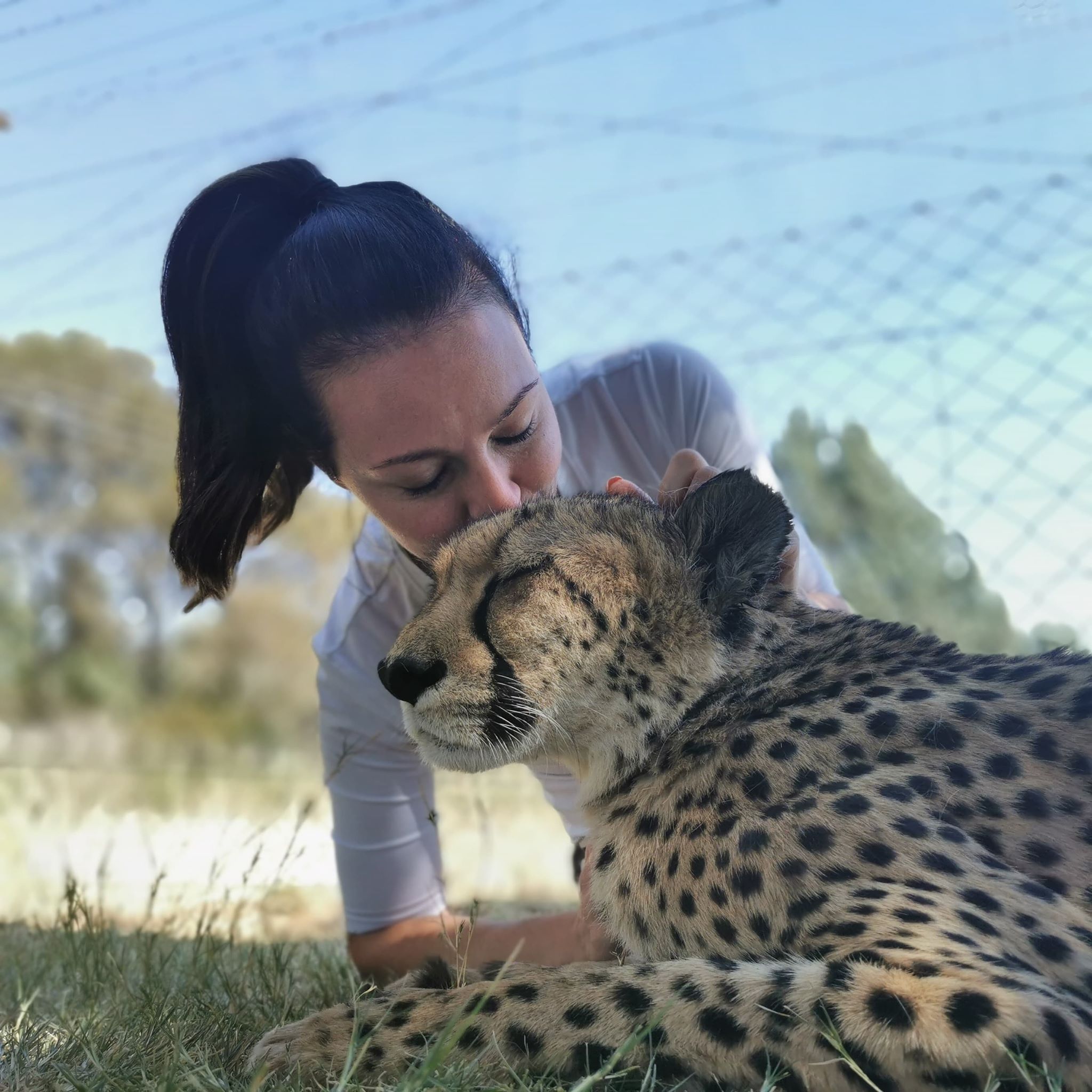 Aurelia is learning that everything – every bug, plant, and animal – works in harmony and how fragile that harmony can be. |
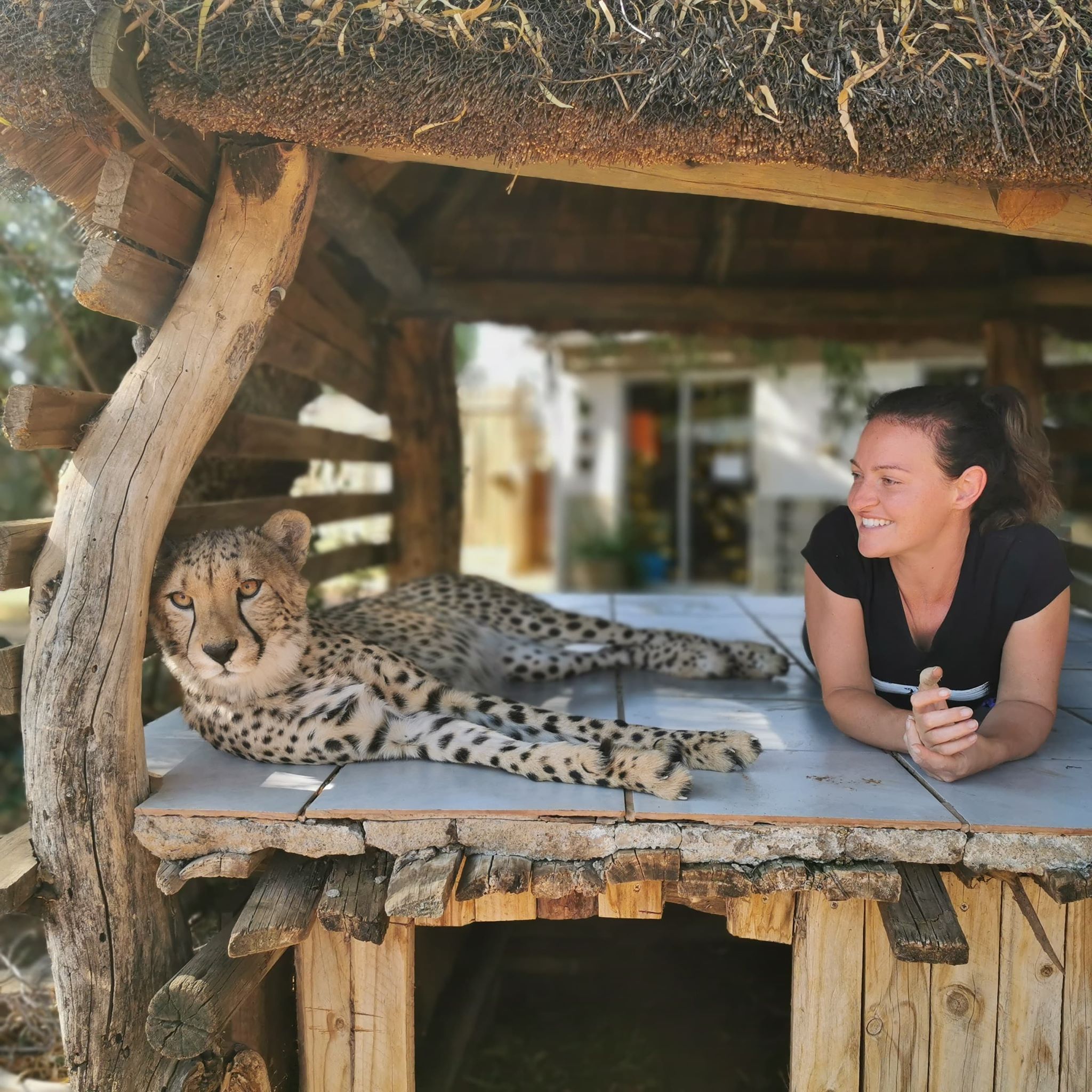 Aurelia and friend at the Cheetah Experience in South Africa |
Aurelia says her whole world has been changed simply by living simply. Being in Africa, in the bush with animals all day takes some adjusting. She is learning that everything – every bug, plant, and animal – works in harmony, and how fragile that harmony can be.
Now, she thrives on being uncomfortable.
“Uncomfortable only means that there is something I am unfamiliar with or don’t understand, or I have something new I need to learn. I joke that “I know nothing”(Game of Thrones joke), but in reality, there is so much to learn every day from different people and cultures,” she says. “It’s amazing how strangers will go completely out of their way to help you. Some of those strangers have become friends over my travels. This has changed my perspective on people in this world. The world is full of good people, and you just need to be brave enough to talk to strangers to find them.”
And me? I find mine when I break away from my group and get uncomfortable on a solo mission that stretches my values but expands my worldview.
In 2016, on my second journey to Ethiopia’s Omo Valley, my friend, and guide Teddy Berhanu asks our group if we want to witness bull jumping – a coming of age ceremony that marriage-aged tribesmen of the Hamer tribe must participate in.
The sticking point for North American sensibilities? As part of the proceedings, tribeswomen cajole the maza (successful bull jumpers) to whip them and beat them with sticks. It’s a symbol of loyalty to the tribe and a form of protection for the tribeswomen. The more scars a woman has on her back, the more respected (and thus, protected) she is.
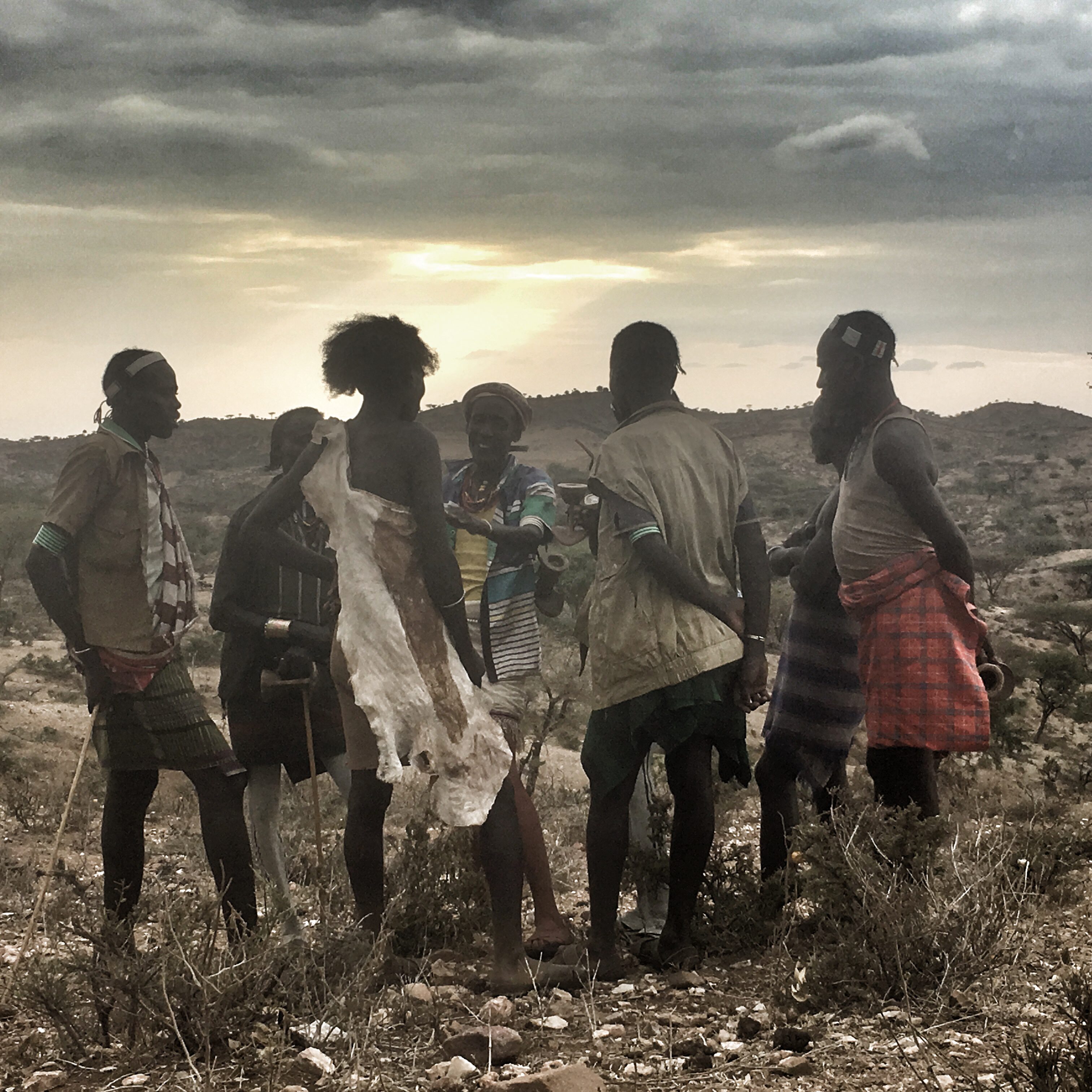
The Maza (successful bulljumpers) instructing the husband-to-be
Almost everyone in our group, deeply uncomfortable with the thought of observing ceremonial violence, refuses. Before I can open my mouth to do the same, my inner voice reminds me that sometimes, we need to get uncomfortable. Sometimes, we need to see things we’d rather not to understand more of the world – the parts and people that are vastly different than what we’re accustomed to. So, I agree to accompany Teddy with a heavy heart and great trepidation.
As I view the beatings through my Western lens, I take several steps back in retreat until my back juts up rigid against a cliff wall – a silent protest. When I can retreat no further, I feel my cheeks heat up suddenly – a sure sign that hot and helpless tears are about to follow. Before the first one can spill over, Teddy is at my side, searching my ashen face with worry on his. He talks me through it, even after I protest that I am okay, that I simply need to trade that Western lens for a wider angled one. Which I do, when Teddy explains that the government once tried to step in and stop this practice, but the tribeswomen refused, saying the government has no right to tell them what they can or can’t do with their bodies.
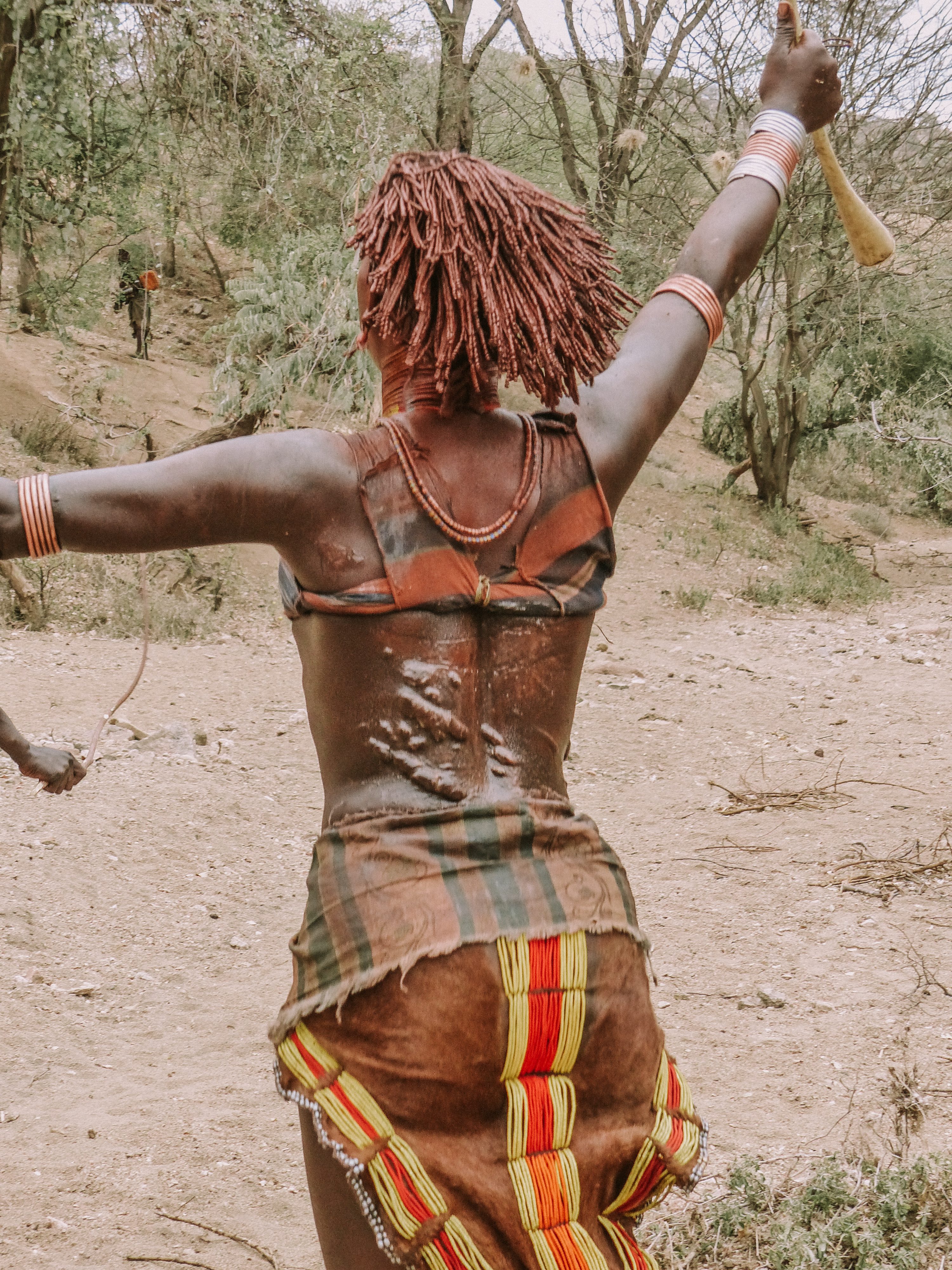
Woman of the Hamer tribe dancing after being ceremonially whipped
That complicated, tangled knot of conflicted emotion in my chest unravels swiftly and effectively. And suddenly, I start to observe what’s happening around me with open eyes, and an open mind and heart. The tribeswomen begin to parade and dance in a circle, trumpeting, chanting, ringing bells on their wrists and ankles. The joy and abandon etched on their faces is intoxicating – a stark contrast to the rivulets of blood still trickling from thick rope-like welts on their backs, shining slickly under the mid-afternoon sun.
My worldview expands by several hot and dusty miles. From that day on, I never look at any issue through only my own narrow lens. I get curious. I get compassionate. I ask questions. And I don’t hold myself back from seeing and experiencing things that make me uncomfortable.
Do you have a growth or transformation story to share with us? Email it to [email protected].
More Transformational Travel to Inspire You
Cactus Cocktails and Low-emission Coffee? What We Can Learn From the Caribbean Island of Bonaire
From cactus cocktails to low-emission cups of coffee, the Caribbean island of Bonaire, population 22,500, is a leader in sustainability, with lessons to teach about the transformative impact of travel.
What My Epic Road Trip Across Southern Africa Taught Me
A road trip across the wilds of Southern Africa helps draw attention to the small things that might have been taken for granted in the past.
JourneyWoman Webinar Series: Wellness and Transformational Travel on March 12
Join our March 12 webinar to learn more about transformational travel from experts in the JourneyWoman Women’s Travel Directory.

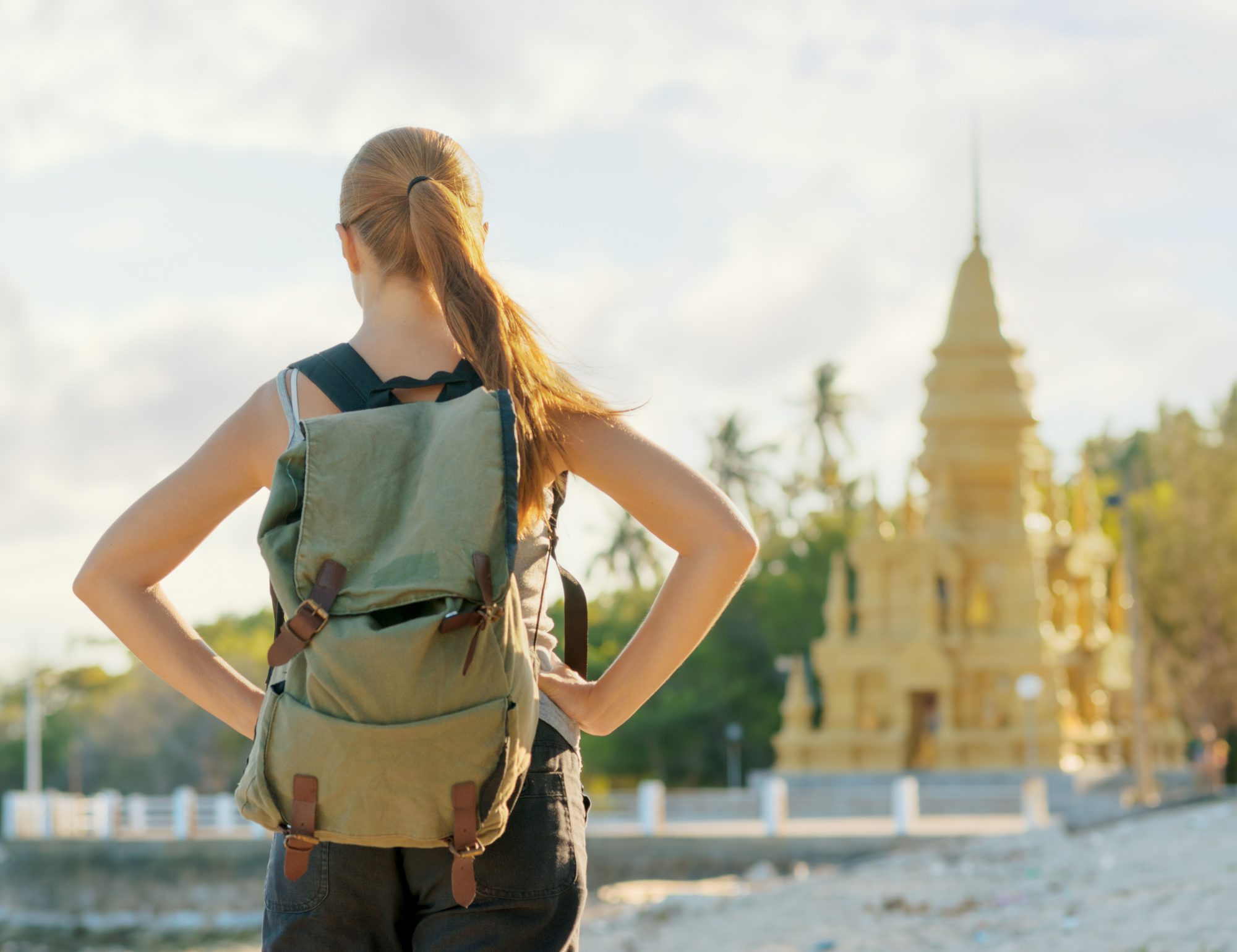



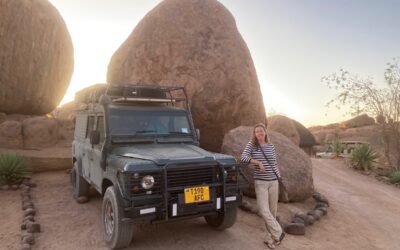
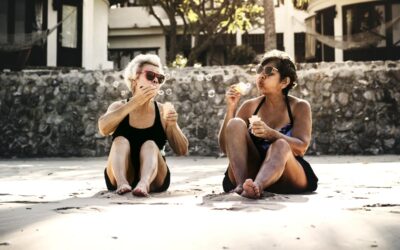
0 Comments
We always strive to use real photos from our own adventures, provided by the guest writer or from our personal travels. However, in some cases, due to photo quality, we must use stock photography. If you have any questions about the photography please let us know.
Disclaimer: We are so happy that you are checking out this page right now! We only recommend things that are suggested by our community, or through our own experience, that we believe will be helpful and practical for you. Some of our pages contain links, which means we’re part of an affiliate program for the product being mentioned. Should you decide to purchase a product using a link from on our site, JourneyWoman may earn a small commission from the retailer, which helps us maintain our beautiful website. JourneyWoman is an Amazon Associate and earns from qualifying purchases. Thank you!
We want to hear what you think about this article, and we welcome any updates or changes to improve it. You can comment below, or send an email to us at [email protected].